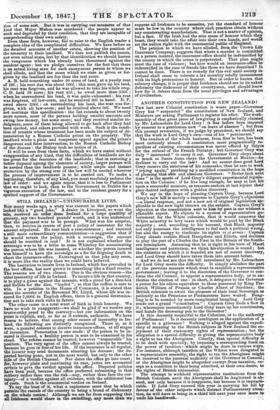ANOTHER CONSTITUTION FOR NEW ZEALAND THE last new Colonial constitution
is waste paper—Governor Grey has " suspended" the constitution of New Zealand, and Ministers are asking Parliament to register his edict. The work- manship of that great piece of lawgiving is emphatically .claimed by Mr. Labouchere for Lord Grey : it has before been imputed by rumour to a gentleman now "on leave of absence"; but from this prompt revocation, if we judge by precedent, we should say that the work is Lord Grey's own—one of his " pentimenti." The conduct of the whole business, from first to, last, has been most curiously absurd. A constitution more pragmatically re- gardless of existing circumstances was never offered by Sieyeti for the refusal of the French Dictator ; but Governor Grey was duly " instructed" to carry it out. Governor Grey obeys about as much as Santa Anna obeys the Government at Mexico—he declines to carry out the law And no sooner does good Lord Grey receive the strictures of his namesake, than he sets to work, " trying again," patching up a modified constitution in the hope of pleasing that able and absolute Governor. " Better luck next time " is the motto of Lord Grey's diligent experimental legisla- tion on the Colonies : if he live long enough, he may at last hit upon a successful measure, as treasure-seekers at last rejoice their grey-haired indigence with a golden discovery. We say in the hope of pleasing Captain Grey, because Lord Grey's new bill is merely a response to Captain Grey's objections' —a literal response, and not a new act of original legislation ap- plicable to the new light thrown on the subject. Captain Grey's objection to the constitution sent to him by post is not without a plausible aspect. He objects to a system of representative go- vernment for the White colonists, that it would empower the White minority to levy taxes which would be paid by the Black majority ; and, according to his account, that Black majority not only possesses the intelligence to feel such a political wrong, but also the energy to vindicate its rights vi et amnia : Captain Grey dreads certain Black Hampdens and Elliots, and declines to play the part of a Charles the First in the Britain of the South- ern hemisphere. Assuming that he is right in his view of Maori intelligence and patriotism, we think his objection is sound ; but the statistics on which it is founded are not of recent discovery, and Lord Grey should have taken them into account before. And we do not see that the bill introduced by Mr. Labouchere for Lord Grey meets the difficulty. It simply abolishes the part of the previous measure which went to establish a representative government ; leaving it to the discretion of the Governor to con- tinue the old Council, to appoint a representative body, or to au- thorize the election of one : in short, it delegates to the Governor a power for his edicts equivalent to those possessed by King Fre- derick William of Prussia or Charles Albert. of Sardinia; the British colonists to await the pleasure of their local Sovereign as patiently as the Prussians or Piedmontese have waited. Bung- ling is to be mended by more complicated bungling. Lord Grey
sends out a grand " i constitution " : Captain Grey finds a flaw in it; whereupon incontinently Lord Grey tears up his constitution, and hands the decreeing pen to the Governor I
Is this decently respectful to the Colonists, or to the authority of Parliament ? Is it decently intelligent as the application of a specific to a grievance ? Nothing is alleged against the expedi- ency of securing to the British subjects in New Zealand the en- joyment of their customary rights of representation; but the allegation is a special difficulty in giving the representative body a right to tax the Aborigines. Clearly, that special difficulty is to be dealt with specially, by imposing a corresponding limit on the 'power of taxation : which might be done in various ways. For instance, although taxation of the Whites were delegated to a representative assembly, the right to tax the Aborigines might be reserved to the paternal authority of the Governor in Council; or the Aborigines might be altogether exempt from taxation, ex- cept as a condition to their being admitted, at their own desire, to
the rights of British citizenship. •
The attempt to withhold representative institutions from the British Colonists until the Aborigines shall be Anglicized is ab- surd, not only because it is inapposite, but because it is impracti. cable. If Lord Grey succeed this year in carrying his bill by favour of the other subjects which distract Parliamentary atten- tion, he will have to bring in a third bill next year once more to undo his handiwork.

























 Previous page
Previous page